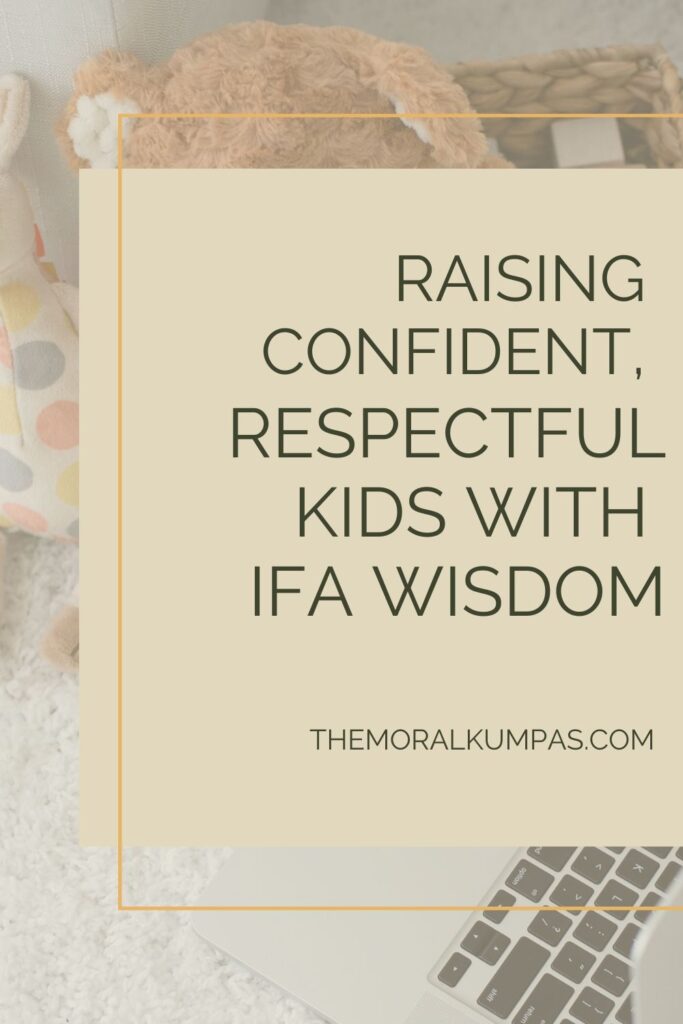RAISING CHILDREN WITH IFA VALUES – TEACHING HONESTY AND RESPECT EARLY.

The Power of Early Guidance
Children are sponges. The values they absorb early shape how they see themselves, others, and the world. In Ifa, raising a child is not just about survival—it’s about character. Raising children with Ifa values means instilling traits like honesty, respect, humility, and responsibility from day one. And the best part? These principles aren’t abstract or mystical—they’re deeply practical and made for everyday life.
Heads Up! Before we dive in, check out the Mini Weekly Flow to get started.
I’ve bundled a weekly resource for the most important areas of your life: love/relationships, career/finances, mindset/self-awareness and more to make reaching your goals simple. To take control of your life and make things simple, you can start planning your week ahead when you signup for your free weekly mini-flow newsletter.
Why Character Starts at Home
Ifa emphasizes iwa rere (good character) as a foundation for a meaningful life. When children grow up in a home where values like honesty and respect are consistently modeled and encouraged, they develop the emotional tools to make better decisions—at school, at home, and eventually, at work.
Practical Ifa parenting means making these values part of everyday conversations, chores, discipline, and encouragement—not just lectures or punishments.
Teaching Honesty Without Shame
Honesty (imotele) in Ifa is not about fear of punishment—it’s about alignment with truth.
To raise truthful children:
- Model truth-telling: If you make a mistake, admit it. Let them see accountability in action.
- Create a safe space: If a child fears harsh punishment, they’ll lie to avoid it. When children know they can tell the truth and be met with calm correction, they learn to value honesty.
- Praise truth, even when it’s hard: Celebrate moments when your child tells the truth, especially when it was difficult for them.
Respect That’s Rooted in Self and Others
In Ifa, respect (ìbà) is multi-directional: we respect elders, peers, nature, ourselves, and even silence. Teaching this starts with simple daily actions:
- Use respectful language: Model how to speak to others, even during conflict.
- Involve them in family roles: Let them greet elders, say thank you, and help with small tasks.
- Explain the “why”: Respect isn’t blind obedience. Teach that it builds trust and community.
Everyday Practices for Building Ifa Values
Here are simple, actionable ways to weave Ifa values into parenting routines:
- Morning check-ins: Ask how your child feels. Use this to model emotional honesty and self-awareness.
- Evening reflection: Before bed, ask what choices they felt proud of that day—and what they might do differently next time.
- Storytelling: Share short Ifa-inspired stories (real or adapted) that show the benefits of honesty, kindness, and humility.
- Responsibility rituals: Assign small age-appropriate responsibilities, linking them to character-building (“In Ifa, taking care of your space shows you can take care of others too”).
Discipline Through Accountability, Not Fear
Ifa doesn’t promote discipline through domination. Instead, it encourages thoughtful correction rooted in accountability. When your child missteps:
- Ask questions, don’t assume: “What happened?” gives them space to reflect instead of shut down.
- Use consequences that connect: If they lied, they can write or talk about why honesty matters.
- Offer a path to make amends: Teach that making things right is part of growth, not shame.
Final Thoughts: Raising Tomorrow’s Adults Today
Raising children with Ifa values means giving them the tools to navigate life with integrity, empathy, and strength. In a world full of noise and distraction, Ifa offers steady, timeless wisdom that can guide parenting with clarity.
Your child doesn’t need to know ancient verses or rituals. What they need is your example, your encouragement, and your consistency in modeling a life led by truth, respect, and purpose.
Strengthen how you speak and connect — with yourself, your goals, and the people who matter most.
Explore more Ifá-inspired insights in the Connection & Speech (Ọ̀rọ̀) Library
Want to bring more balance and clarity to your parenting journey?
I’m giving you a heads up and exact way to to help you think better, move smarter, and live with more clarity, balance, and confidence every day.
Ready to level up?


